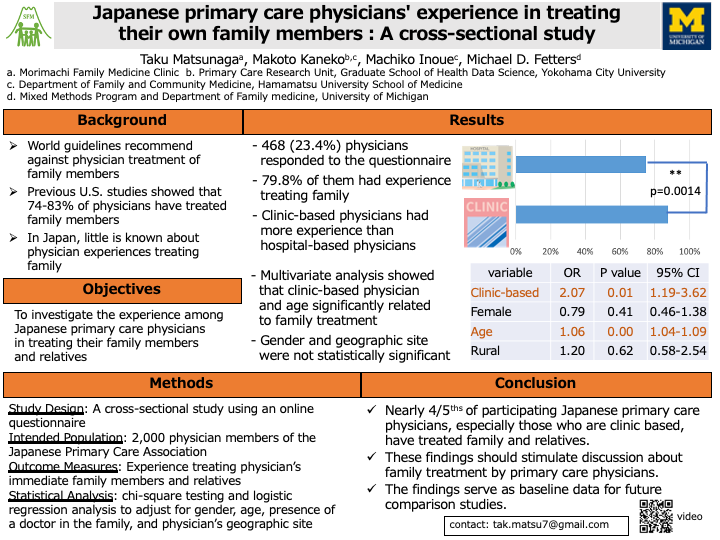SRFP063: Japanese primary care physicians' experience in treating their own family members: A cross-sectional study
Taku Matsunaga, MD; Makoto Kaneko, MD, PhD; Machiko Inoue, MD, PhD, MPH
Abstract
Objective: To investigate the experience in treating their own family members and relatives among primary care physicians in Japan.
Study Design: Cross-sectional study using an online questionnaire
Setting / Population Studied: Two thousand physicians in their third year or more after graduation who are members of Japan Primary Care Association.
Primary Outcome: Having experience in treating physicians’ own family members and relatives
Statistical Analysis Methods: We conducted a chi-square test to compare experience in treating the family members between clinic-based doctors and hospital-based doctors. Also, we performed a logistic regression analysis to adjust gender, age, presence of a doctor in the family, and physician’s workplace (rural or not rural).
Results: A total of 468 (23.4%) physicians responded to the questionnaire; 79.8% of them had experience in treating their family members or relatives. In univariate analysis, clinic-based physicians were associated with experience in treating the family members compared to hospital-based physicians (87.6% vs 74.9%: p=0.001). Multivariate analysis showed that a clinic-based physician (odds ratio 2.07: 95% confidence interval 1.19-3.67) and age (odds ratio 1.06: 95% confidence interval 1.04-1.09) were significantly related to the experience. Gender and workplace were not statistically significant factors.
Conclusions: A high percentage of Japanese primary care physicians also have experience in treating their own family members and relatives, especially those who work in clinics. The results of this study will serve as basic data for future studies on the care of physicians’ own families and relatives in Japan.

Judy Belle Brown
jbbrown@uwo.ca 11/20/2021Important work - thank you!